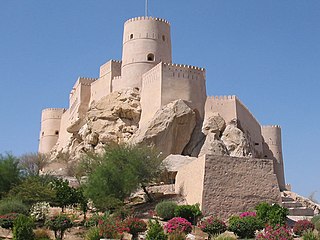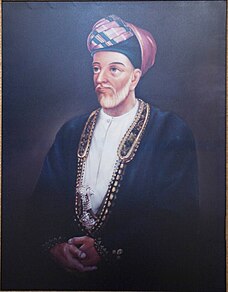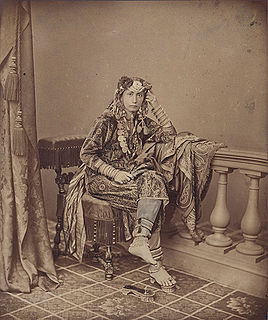
Oman is the site of pre-historic human habitation, stretching back over 100,000 years. The region was impacted by powerful invaders, including other Arab tribes, Portugal and Britain. Oman once possessed the island of Zanzibar, on the east coast of Africa as a colony.

Muscat is the capital and largest city of Oman. It is the seat of the Governorate of Muscat. According to the National Centre for Statistics and Information (NCSI), the total population of Muscat Governorate reached 1.4 million as of September 2018. The metropolitan area spans approximately 3,500 km2 (1,400 sq mi) and includes six provinces called wilayats. Known since the early 1st century CE as an important trading port between the west and the east, Muscat was ruled by various indigenous tribes as well as foreign powers such as the Persians, the Portuguese Empire, the Iberian Union and the Ottoman Empire at various points in its history. A regional military power in the 18th century, Muscat's influence extended as far as East Africa and Zanzibar. As an important port-town in the Gulf of Oman, Muscat attracted foreign tradesmen and settlers such as the Persians and the Balochis. Since the ascension of Qaboos bin Said as Sultan of Oman in 1970, Muscat has experienced rapid infrastructural development that has led to the growth of a vibrant economy and a multi-ethnic society.

Sayyid Hamoud bin Mohammed Al-Said, GCSI, was the British-controlled Omani sultan of the protectorate of Zanzibar, who outlawed slavery on the island.
Sa‘id is a male Arabic given name, which means "happy". For the female version, see Saida; for the Turkish variant, see Sait; for the Bosnian variant, see Sejad and Sead. Said or Sid is the spelling used in most Latin languages.

SayyidBarghash bin Said Al-Busaid, GCMG, GCTE, son of Said bin Sultan, was the second Sultan of Zanzibar. Barghash ruled Zanzibar from October 7, 1870 to March 26, 1888.

Sayyid Hamad bin Thuwaini Al-Busaid, GCSI, was the fifth Sultan of Zanzibar. He ruled Zanzibar from March 5, 1893 to August 25, 1896.

Sayyid Turki bin Said, GCSI was Sultan of Muscat and Oman from 30 January 1871 to 4 June 1888. He was the fifth son of Said bin Sultan.

Said bin Sultan Al-Said was Sultan of Muscat and Oman from 1806 to 4 June 1856.

The Sultanate of Muscat and Oman was a thalassocratic nation that encompassed the present-day Sultanate of Oman and parts of present-day United Arab Emirates and Gwadar, Pakistan. The country is not to be confused with Trucial states, which were sheikhdoms under British protection since 1820.

The Sultanate of Zanzibar, also known as the Zanzibar Sultanate, comprised the territories over which the Sultan of Zanzibar was the sovereign. Those territories varied over time, and at one point included all of what is now Kenya as well as the Zanzibar Archipelago of the Swahili Coast. Later, the kingdom's realm included only a ten mile wide coastal strip of Kenya and Zanzibar. Under an agreement concluded on 8 October 1963, the Sultan relinquished sovereignty over his remaining territory in Kenya. On 12 January 1964, Sultan Jamshid bin Abdullah was deposed and lost sovereignty over the last of his dominions, Zanzibar.
Sultan Sālim bin Thuwainī Āl Saʿīd was the Sultan of Muscat and Oman from 11 February 1866 – October 1868. He was the eldest son of Sultan Thuwaini bin Said and his wife Sayyida Ghaliya bint Salim Al-Busaidiyah, and acceded to the throne in succession to his father. Lewis Pelly and Henry Bartle Frere were deeply disappointed by the death of Sultan Thuwaini bin Said in their hopes for a military action against the Wahhabis, and were well aware of Salim's opposing views and refusal to join the ensuing war. Hence the British Political Resident General in the Gulf at Bushehr, Colonel Lewis Pelly, fiercely opposed the recognition of Salim whom he feared was to stop foreign interference and forge a peace deal with the Wahhabis.

The House of Al SaidArabic pronunciation: [æl Busaidi] Alternatives: or (Al-Busaidi) is the ruling Royal House of the Sultanate of Oman, and former ruling Royal House of The Sultanate of Muscat and Zanzibar and The Sultanate of Zanzibar.

Sayyid Badr bin Hamad bin Hamood Albusaidi is an Omani diplomat who is the Secretary-General of the Ministry of Foreign Affairs of Oman, holding the rank of minister. Sayyid Badr has represented Oman in regional and international meetings, which include the United Nations.

The Omani Empire was a powerful maritime empire, vying with Portugal and Britain for influence in the Persian Gulf and Indian Ocean. At its peak in the 19th century, Omani influence or control extended across the Strait of Hormuz to modern-day Iran and Pakistan, and as far south as Cape Delgado. After the death of Said bin Sultan in 1856 the empire was divided into two sultanates, an African section ruled by Majid bin Said and an Asian section ruled by Thuwaini bin Said.
Ahmad bin Said al-Busaidi was the first ruler of Oman of the Al Said dynasty. He came to power during a period when Oman was divided by civil war, and the Persians had occupied large parts of the country. During his long rule as Imam the country prospered and regained its leading position in the Persian Gulf.
Qais bin Ahmad was the third son of Ahmad bin Sa'id Al-Busaidi, the first Sultan of Oman of the Al Said dynasty. After his father's death he made more than one attempt to gain the throne.
The following is a timeline of the history of the city of Muscat, Oman.














